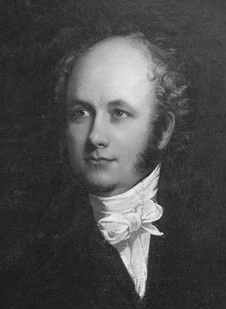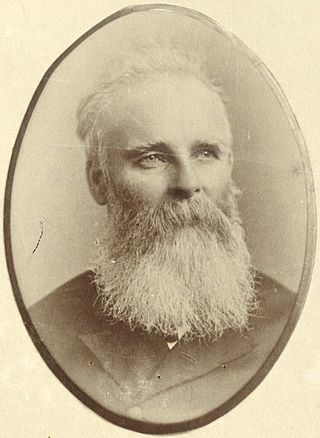Related Research Articles
The Register, originally the South Australian Gazette and Colonial Register, and later South Australian Register, was South Australia's first newspaper. It was first published in London in June 1836, moved to Adelaide in 1837, and folded into The Advertiser almost a century later in February 1931.

Sir John Morphett was a South Australian pioneer, landowner and politician. His younger brother George Morphett was also an early settler in South Australia.

William Giles, occasionally referred to as William Giles, sen. to distinguish him from his eldest son, was the third colonial manager of the South Australian Company, and a South Australian politician, prominent in the founding of the state of South Australia.

Robert Thomas was a Welsh newspaper proprietor, printer and early settler of South Australia who was born on a farm 'Rhantregynwen', at Llanymynech, Powys, Wales.
Adelaide Educational Institution was a privately run non-sectarian academy for boys in Adelaide founded in 1852 by John Lorenzo Young.
He avoided rote learning, punishment and religious instruction, but taught moral philosophy, physiology, political economy and mechanical drawing ... (and) surveying on field trips.
George Scarfe was a merchant in Adelaide, South Australia, a partner in the firm of George P. Harris, Scarfe, & Co., later known as Harris Scarfe. Called a "genius of commerce", he was largely credited with the firm's early success and gained great personal wealth. His brother T. R. Scarfe (1843–1915), nephew F. G. Scarfe (1867–1961) and Frederick George's son-in-law C. C. Deeley were prominent in the 20th century development of the company.

Thomas Burgoyne was a builder and politician in the early days of the colony of South Australia.

Charles Hervey Bagot, often referred to as "Captain Bagot", was an Irish-born South Australian pastoralist, mine owner and parliamentarian, and was the ancestor of a number of notable South Australian citizens.

William James Browne,, generally referred to as Dr. Browne, was a grazier and pastoralist in South Australia who was born and died in England. His brother, John Harris Browne, was a noted explorer and pastoralist in the same colony.

James Pearce was a South Australian businessman and politician based in Kapunda.
Charles Burney Young, generally referred to as C. B. Young, was a landholder, winemaker and politician in the early days of the colony of South Australia.
Joseph Barritt was a pastoralist and politician in the colony of South Australia.
George William Cole was a politician in the colony of South Australia.
Charles Fenn was a solicitor and member of the first Legislative Council in the Colony of South Australia.
Henry Lamshed was a farmer and politician in colonial South Australia.

Arthur Short was a politician in the British colony of South Australia.
Thomas Williams of Rushden Hall & Wanfield Lodge was a politician in the colony of South Australia, serving as a non-official acting member of the Legislative Council of South Australia from June 1843 to September 1843.
John Henry Mason Hawkes was a businessman in the early days of Adelaide, South Australia
George Peter Harris was the co-founder of the South Australian company that became Harris Scarfe.

Minna Pauline Fischer was an Australian lyric soprano and singing teacher in London.
References
- ↑ "Advertising". South Australian Register . 27 January 1853. p. 1. Retrieved 1 June 2015– via Trove.
- ↑ "Police Court — Adelaide". The South Australian Advertiser . 6 January 1859. p. 3. Retrieved 1 June 2015– via Trove.
- ↑ "Harris v. Fisher". Adelaide Times . 28 March 1856. p. 3. Retrieved 15 May 2017– via Trove.
- ↑ "Liberty of the Press". South Australian Register . 2 December 1848. p. 2. Retrieved 1 June 2015– via Trove.
- ↑ "Daniel Fisher". Former members of the Parliament of South Australia . Retrieved 20 November 2022.
- ↑ "Kensington and Norwood". South Australian Register . 2 December 1862. p. 3. Retrieved 15 May 2017– via Trove.
- ↑ "Death of Mr. Daniel Fisher, J.P." South Australian Register . 5 June 1884. p. 3. Retrieved 1 June 2015– via Trove.
- ↑ "Family Notices". The Sydney Morning Herald . 11 March 1848. p. 3. Retrieved 1 June 2015– via Trove.
- ↑ "Law Courts". South Australian Chronicle and Weekly Mail . 7 August 1880. p. 10. Retrieved 1 June 2015– via Trove.